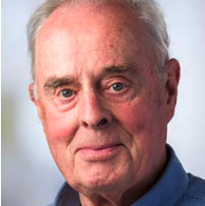Rainer F.
Storb
M.D.

(206) 667-4407
Fred Hutchinson Cancer Center
1100 Fairview Ave. N, D1-100
Seattle, WA 98109
Photo: Fred Hutch
Education, Training, Board Certifications
- M.D., University of Freiburg, Germany
- State Medical Examination, University of Freiburg
Clinical Expertise
- Hematopoietic stem cell transplantation
- Hematologic malignancies
- Aplastic anemia
Affiliations
- Fred Hutchinson Cancer Center - Faculty & Lab
- University of Washington
- Fred Hutchinson Cancer Center - Provider
Publications
Research and/or clinical interests
Dr. Rainer Storb is one of the pioneers who established allogeneic, or donor, blood and marrow stem cell transplantation as a cure for diseases like leukemia, myelodysplastic syndromes, lymphoma and aplastic anemia. Over his career, his research has established more effective, less toxic transplant approaches. Through fundamental and translational research, he continues to explain and eliminate major barriers to successful transplant. These include rejection and failure of the transplanted cells and graft-vs.-host disease, or GVHD, and the discovery that grafted donor immune cells play a pivotal role in eliminating the patient’s malignant cells, a form of allogeneic immunotherapy. In GVHD, transplanted immune cells attack the patient’s healthy tissues. He is also working to reduce toxicities and maximize the cancer-killing powers of transplanted immune cells. One of Dr. Storb’s major scientific contributions is the non-myeloablative transplant. Non-myeloablative transplant, sometimes called "mini-transplant," involves minimal pre-transplant radiation. It has extended the lifesaving benefits of transplantation to older or more-infirm patients who are not eligible for traditional protocols.
Current research interests include:
- Transplantation biology
- Basic and translational research into the biology of allogeneic blood and marrow hematopoietic cell transplantation (HCT)
- Developing radically different approaches for HCT that have minimal toxicity, and thus are safe enough to administer in the ambulatory care setting
- Extending treatment with HCT from related and unrelated donors to include elderly and medically infirm patients with advanced hematologic malignancies and eradicating underlying disease with immunologic graft-vs.-tumor effects
- Applying minimal-intensity conditioning regimens to treat patients with serious non-malignant blood disorders, such as aplastic anemia, hemoglobinopathies and immune deficiency diseases, by allogeneic HCT
- Developing novel methods for preventing acute GVHD and treating chronic GVHD in animal models based on mechanistic studies
- Investigating graft-host tolerance by establishing transient mixed hematopoietic chimerism as a prelude for acceptance of solid organ transplants



